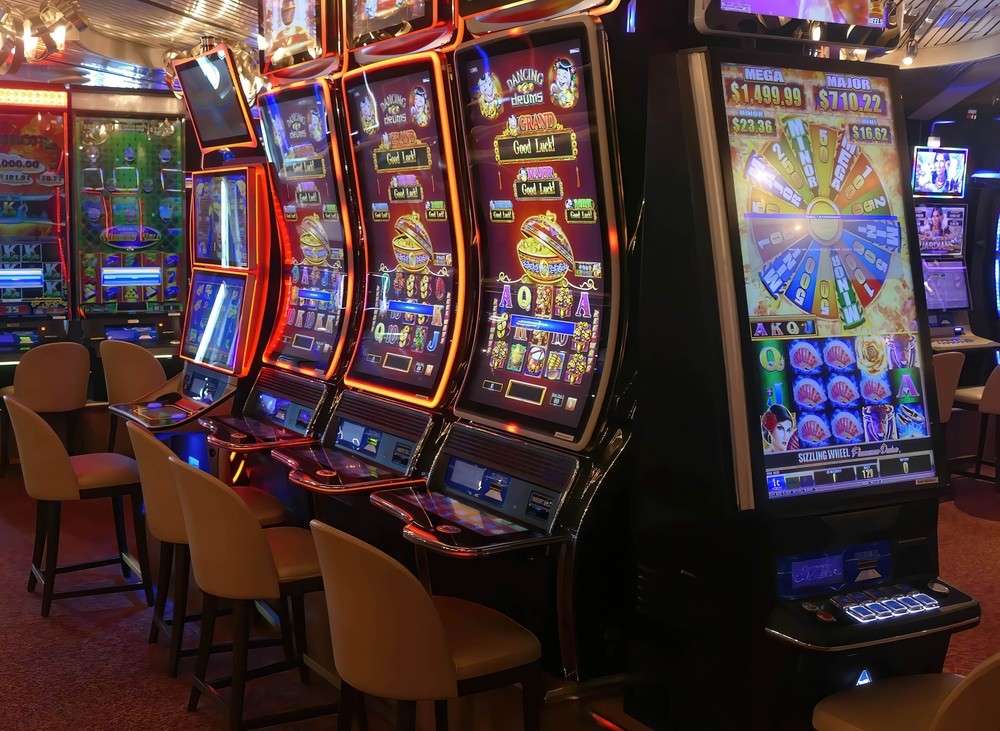The world of gambling is on the cusp of a revolutionary transformation, thanks to the emergence of blockchain technology. Traditionally, online casinos have relied on centralized systems to handle transactions, manage player data, and ensure fair play. However, with the advent of blockchain, a decentralized and transparent approach to gaming is taking center stage. In this article, we delve into the fascinating realm of blockchain technology and its potential to reshape the landscape of online casinos, offering increased security, fairness, and convenience to players and operators alike.
Decentralization and Transparency
Blockchain technology has revolutionized various industries, and the online casino sector is no exception. Its decentralized nature provides a secure and transparent environment for players, ensuring that data is not vulnerable to manipulation or unauthorized access. In a traditional online casino, players may have concerns about the fairness of games and the reliability of the casino’s operations. However, with blockchain, all transactions and gaming outcomes are recorded on a public ledger that is accessible to everyone, ensuring transparency at every step.
One of the primary advantages of blockchain technology in online casinos is its ability to create provably fair games. Provably fair algorithms allow players to verify the authenticity and fairness of each game’s outcome. Players can check the random number generation process and ensure that the casino has not tampered with the results. This level of transparency builds trust between the casino and its players, making them more confident in the games they play and the platform they use.
Moreover, blockchain technology eliminates the need for intermediaries, such as payment processors or third-party auditors, in casino transactions. This not only streamlines the payment process but also reduces costs for both the casino operators and the players. As a result, players can enjoy faster and more secure transactions, with the assurance that their funds are handled directly by the blockchain network.
The decentralized nature of blockchain also enhances security in online casinos. In traditional online casinos, player data and financial information are stored on centralized servers, making them susceptible to hacking and data breaches. In contrast, blockchain technology stores data across a vast network of computers, making it virtually impossible for hackers to alter or access the information. This heightened security aspect adds an extra layer of protection to the players’ personal and financial data, ensuring a safe gaming experience.
Additionally, blockchain-based casinos often offer players the option to use cryptocurrencies for transactions. Cryptocurrencies provide anonymity to players, as they do not require the disclosure of personal information during transactions. This anonymity appeals to players who value their privacy and prefer not to share sensitive data with online platforms.
Furthermore, blockchain technology allows for more efficient and transparent handling of casino bonuses, promotions, and loyalty programs. Smart contracts can be used to automate the distribution of rewards, ensuring that players receive their bonuses promptly and without any ambiguity. The transparent nature of the blockchain ledger also allows players to track and verify their rewards, enhancing their overall gaming experience.
Blockchain technology has brought significant advancements to the online casino industry. Its decentralized nature ensures transparency, provably fair gaming, enhanced security, and streamlined transactions, which ultimately fosters trust between players and casino operators. As blockchain technology continues to evolve, we can expect to see even more innovative solutions that further enhance the gaming experience, making online casinos more appealing and reliable for modern players.

Blockchain Technology: Enhanced Security and Privacy
Blockchain’s security features are fundamental to its appeal in online casinos. With advanced cryptographic algorithms, blockchain provides a high level of protection for players’ personal and financial information. In traditional online casinos, players often need to share sensitive data, such as credit card details and personal identification, to make transactions. This exposes them to potential data breaches and identity theft if the casino’s centralized servers are compromised. However, in blockchain-based casinos, player data is encrypted and stored across a decentralized network of computers. This makes it extremely difficult for hackers to access and manipulate the information, significantly reducing the risk of data breaches and identity theft.
Moreover, blockchain technology ensures secure management of funds and winnings. In traditional online casinos, players may face delays in receiving their winnings or encounter issues with withdrawals due to the involvement of third-party payment processors. Blockchain eliminates the need for intermediaries, enabling direct peer-to-peer transactions. When a player wins at a blockchain-based casino, the winnings are automatically and securely transferred to their digital wallet without any intermediaries. This streamlined process not only ensures faster transactions but also minimizes the chances of fraudulent activities or disputes related to payments.
Another crucial aspect of blockchain security is its immutability. Once a transaction or gaming outcome is recorded on the blockchain, it cannot be altered or deleted. This feature prevents any manipulation or tampering of gaming results, ensuring the integrity of the casino’s operations. Players can independently verify the fairness of each game’s outcome, knowing that the data is recorded transparently on the blockchain. This transparency builds trust and confidence among players, as they can be certain that the casino’s games are provably fair and not subject to any external influence.
Furthermore, blockchain’s consensus mechanism ensures that all transactions on the network are validated and agreed upon by the majority of participants. This process, known as consensus, enhances the security of the blockchain by preventing any single entity from controlling the network. The decentralized nature of blockchain and the consensus mechanism make it highly resistant to attacks and manipulation, providing an added layer of security for online casinos.
Overall, blockchain’s advanced cryptographic algorithms, decentralized architecture, and immutability make it a robust and secure technology for online casinos. Players can enjoy a safe and transparent gaming experience, knowing that their personal and financial data is protected, and that gaming outcomes are fair and provably random. As the adoption of blockchain technology in the online casino industry continues to grow, players can expect even more enhanced security measures and innovations that further elevate the safety and integrity of their gambling experiences.
Instant and Low-Cost Transactions
Blockchain-powered casinos revolutionize the transaction process, providing players with near-instantaneous and cost-effective transactions. In traditional online casinos, players often experience delays in depositing and withdrawing funds due to the involvement of intermediary banks or payment processors. These intermediaries introduce additional steps and verification processes, which can lead to processing times that range from a few hours to several days. Such delays can be frustrating for players who wish to start playing immediately or access their winnings promptly.
With blockchain technology, transactions are conducted directly between the player and the casino without the need for intermediaries. When a player initiates a deposit or withdrawal, the transaction is recorded on the blockchain network and verified by a decentralized network of computers. This process, known as consensus, ensures the validity and security of the transaction without the need for a central authority. As a result, transactions on the blockchain are processed much faster, often taking only a few minutes to complete.
Furthermore, blockchain transactions typically involve minimal fees compared to traditional payment methods. In traditional online casinos, payment processors and banks charge fees for processing transactions, which can eat into the players’ gaming budget, especially when making frequent deposits and withdrawals. In contrast, blockchain transactions often have lower fees as they eliminate the intermediaries and their associated costs. The fees charged for blockchain transactions are usually a fraction of the amount charged by traditional payment processors, making blockchain-powered casinos a cost-effective option for players.
The ease and speed of blockchain transactions in online casinos offer numerous benefits to players. Players can quickly deposit funds into their casino accounts and start playing their favorite games without any significant delays. When it’s time to cash out their winnings, players can do so promptly and receive their funds directly into their digital wallets. This convenience enhances the overall gaming experience and ensures that players can make the most of their time at the casino without being hindered by transaction-related frustrations.
Moreover, the secure and transparent nature of blockchain transactions provides players with a heightened sense of trust in the casino’s financial operations. Every transaction is recorded on the blockchain, making it visible and traceable for all participants. Players can independently verify the status of their transactions, ensuring transparency and reducing the likelihood of disputes or discrepancies.
As blockchain technology continues to evolve and gain widespread adoption in the online casino industry, players can expect even more improvements in transaction speed, efficiency, and cost-effectiveness. Blockchain-powered casinos offer a glimpse into the future of online gambling, where seamless transactions and enhanced player experiences are at the forefront. By eliminating the barriers and delays associated with traditional payment methods, blockchain technology is paving the way for a more streamlined and enjoyable gaming journey for players worldwide.

Provably Fair Gaming
Blockchain technology has revolutionized the concept of fair gaming in online casinos through its provably fair feature. Traditional online casinos rely on random number generators (RNGs) to determine game outcomes. While RNGs are designed to be random, they are ultimately controlled and managed by the casino itself, leaving room for potential doubts about the fairness of the games. In contrast, blockchain-powered casinos utilize cryptographic algorithms to generate game outcomes in a transparent and verifiable manner.
When a player participates in a provably fair game, the casino provides a unique cryptographic hash (a long string of characters) before the game starts. This hash is derived from the game’s initial data, such as the seed or outcome, and is publicly available for anyone to inspect. The game then proceeds, and the outcome is determined based on the player’s actions and the casino’s response.
Once the game is complete, the player can verify the fairness of the outcome by comparing the provided hash with the final result. The casino’s server also reveals the seed used to generate the outcome. By running this seed through the same cryptographic algorithm, the player can independently verify that the result matches the hash provided before the game started. If the outcome and the hash do not match, it indicates that the game’s fairness has been compromised.
This provably fair mechanism ensures that neither the player nor the casino can influence the outcome of the game after it has started. It provides mathematical proof that the game was conducted fairly and that the casino did not manipulate the results to its advantage. Players can be confident that they are participating in games where the odds are not skewed in favor of the house, fostering trust and credibility in the online gambling industry.
The transparency and integrity of provably fair gaming have significantly contributed to the rise of blockchain-powered casinos. It addresses one of the major concerns of players in traditional online casinos – the lack of trust in the fairness of the games. By utilizing blockchain technology and cryptographic algorithms, online casinos can offer a new level of transparency that appeals to players who seek a more trustworthy and accountable gambling experience.
Moreover, the provably fair feature aligns with the principles of decentralization, a core aspect of blockchain technology. Since the verification process occurs on the blockchain network rather than being centralized in the hands of the casino, it further enhances the credibility of the gaming platform. The decentralized nature of blockchain ensures that no single entity can manipulate the system, providing players with peace of mind and confidence in the fairness of the games they play.
In conclusion, provably fair gaming is a groundbreaking application of blockchain technology in the online casino industry. By incorporating cryptographic algorithms and public verification, blockchain-powered casinos offer a level of transparency and trust that is unparalleled in traditional online gambling platforms. Players can be assured that the games they play are truly fair and that the outcomes are not influenced by the casino. As the demand for fairness and transparency in online gambling continues to grow, blockchain technology is poised to reshape the landscape of the industry, providing players with a more secure, accountable, and enjoyable gaming experience

Global Accessibility
Blockchain technology’s decentralized nature allows online casinos to operate without being bound by geographical boundaries. Traditional online casinos often face challenges related to jurisdictional regulations, payment processing limitations, and restricted access in certain countries. However, blockchain-powered casinos eliminate many of these barriers, offering a more inclusive and global gaming experience.
Since blockchain operates on a distributed network of computers worldwide, players from different parts of the world can participate in blockchain-powered online casinos without encountering geographical restrictions. This borderless accessibility ensures that players can enjoy their favorite casino games regardless of their location, nationality, or regional regulations.
Moreover, the use of cryptocurrencies as the primary mode of payment in blockchain casinos further enhances the global accessibility. Unlike traditional payment methods, cryptocurrencies are not tied to any specific country’s banking system. This enables players to deposit and withdraw funds seamlessly, irrespective of their location. It also eliminates the need for currency conversions, making transactions smoother and more cost-effective for players worldwide.
The global and inclusive nature of blockchain-powered online casinos has a significant impact on the potential player base. By removing geographical barriers, these casinos can attract a diverse audience from various countries and regions. Players who were previously unable to access online casinos due to restrictive regulations or payment challenges can now participate freely in blockchain casinos.
For players in regions with limited gambling options or restrictive laws, blockchain-powered casinos provide a viable alternative. They can enjoy a wide range of games and experiences without needing to travel to physical casinos or face legal complications. As a result, blockchain casinos can tap into previously untapped markets and expand their user base significantly.
Additionally, the global accessibility of blockchain casinos fosters a diverse and vibrant gaming community. Players from different cultures and backgrounds come together on a single platform, creating a rich and dynamic gaming environment. This diversity also leads to the exchange of gaming strategies, ideas, and experiences, enriching the overall gaming ecosystem.
However, it is essential to note that while blockchain-powered casinos offer global accessibility, they must still comply with relevant legal regulations in the jurisdictions they operate in. The decentralized nature of blockchain does not exempt these casinos from adhering to the laws and regulations of the countries they serve.
Blockchain technology has revolutionized the online casino industry by providing a global and inclusive gaming experience. Players from around the world can access blockchain-powered casinos without facing geographical restrictions or payment challenges. This accessibility opens up new opportunities for players and expands the potential player base for online casinos. It fosters a diverse and dynamic gaming community and enables players to enjoy a seamless, secure, and enjoyable gaming experience, regardless of their location. As blockchain technology continues to evolve and gain widespread adoption, the global accessibility of online casinos is set to transform the way players engage with gambling and gaming entertainment on a global scale.
Bottom Line
The future of gambling is undoubtedly intertwined with blockchain technology. As this revolutionary technology continues to evolve, online casinos are poised to benefit from its decentralized nature, enhanced security, and transparent operations. Players can look forward to a more trustworthy and fair gaming environment, while operators can streamline their processes and offer a seamless experience to users. With blockchain at the helm, the gambling industry is set to embrace a new era of innovation and empowerment, transforming the way we perceive and engage with online casinos.